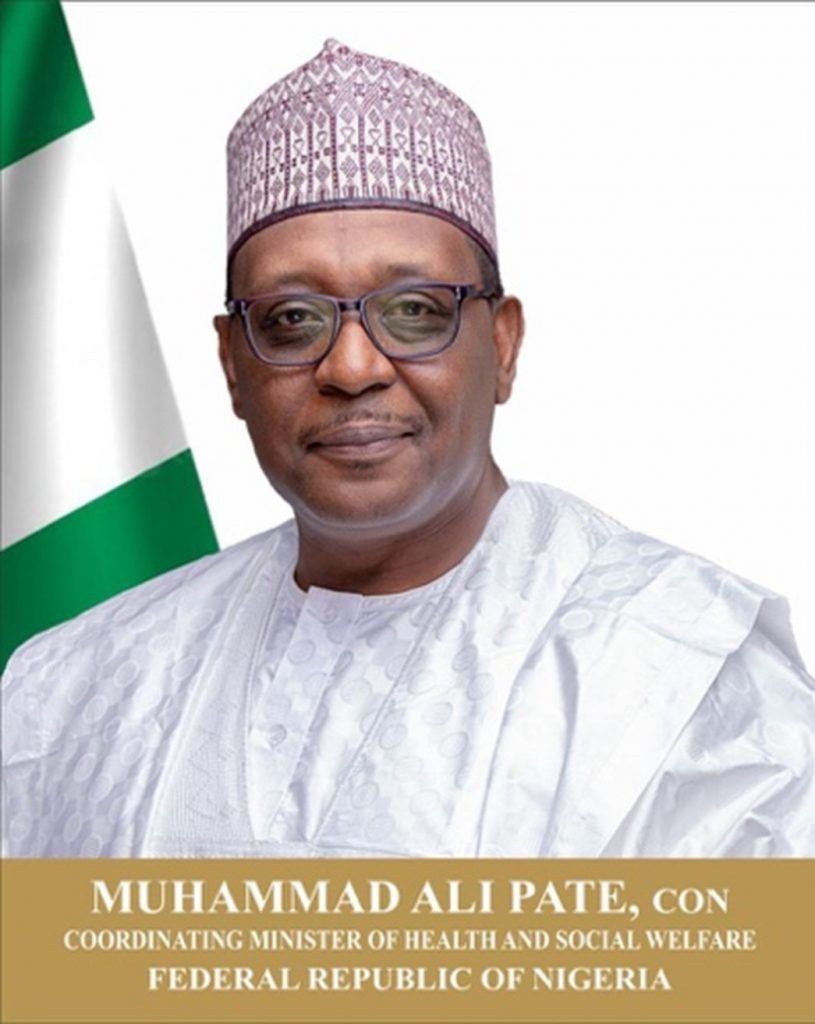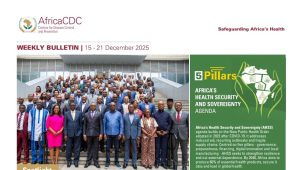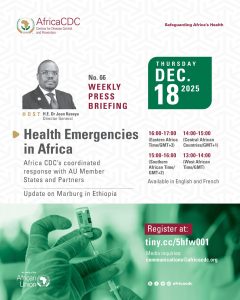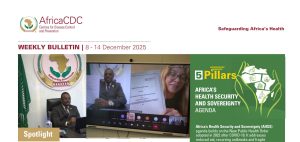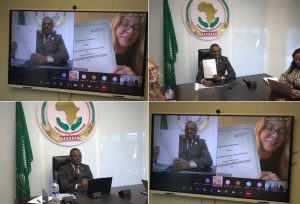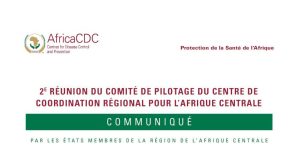Question 1. The African Union, through the Africa CDC, aspires to enhance local vaccine manufacturing, targeting 60% of the continent’s needs by 2040. What steps is Nigeria taking in alignment with this aspiration?
Consistent with the Renewed Hope Agenda of President Bola Ahmed Tinubu, Nigeria is deeply committed to bolstering its local vaccine manufacturing capabilities, in line with the African Union’s vision. To achieve this goal, the government has embarked on a multifaceted approach, starting with the establishment of the National Institute for Pharmaceutical Research and Development (NIPRD). NIPRD’s primary focus has been on cultivating the nation’s vaccine manufacturing capacity, notably encompassing the production of COVID-19 vaccines. Recognizing that collaboration forms the cornerstone of Nigeria’s strategy, the government has forged robust partnerships with esteemed international entities like the World Health Organization (WHO) and the Coalition for Epidemic Preparedness Innovations (CEPI). These collaborations are instrumental in fostering research initiatives and facilitating knowledge exchange, pivotal in advancing local vaccine manufacturing.
Within Nigeria’s Health Sector Renewal Initiative, vaccine production plays a prominent role, embedded in both the ‘Unlocking Value Chains’ and ‘Health Security’ pillars. To concretize this commitment, we’ve laid out specific strategic steps: Firstly, there’s an ardent focus on building and upgrading vaccine manufacturing infrastructure within the country. This involves establishing state-of-the-art facilities equipped with cutting-edge technology and expertise necessary for local vaccine production.
Secondly, Nigeria is fostering public-private partnerships (PPPs) to encourage investments in vaccine manufacturing. Collaborations with pharmaceutical firms, research institutions, and international partners aim to pool expertise and resources towards vaccine development.
Investment in research and development initiatives is another core aspect. Nigeria is channeling resources to support local scientists and institutions engaged in groundbreaking research to enhance our understanding of diseases and develop effective vaccines.
To ensure a skilled workforce, Nigeria prioritizes capacity building and training programs, nurturing professionals in vaccine manufacturing, quality control, and regulatory compliance, aligning with global standards. Furthermore, the government is actively strengthening regulatory frameworks related to vaccine manufacturing, emphasizing safety, efficacy, and quality of locally produced vaccines. Financial support and incentives, including tax incentives and grants, are offered to attract both local and international investors into vaccine manufacturing.
Lastly, collaboration with regional and international bodies, such as the African Union and Africa CDC, remains a priority. Sharing knowledge, best practices, and resources through these collaborations is pivotal to the success of enhancing vaccine manufacturing capacity across the continent.
Question 2. Improving healthcare data and digitization is a crucial part of your plan. Could you share details on your strategy to modernize healthcare information systems and promote the use of electronic health records (EHRs) in Nigeria?
Certainly, our approach to modernizing healthcare information systems and promoting electronic health records (EHRs) in Nigeria is rooted in strategic planning aligned with several guiding principles and initiatives outlined in documents such as the Renewed Hope Agenda, the Nigeria Health Sector Renewal document, and the Nigeria Agenda 2050.
One of the pivotal aspects of our strategy is the development of a comprehensive digital healthcare policy. Recognizing its crucial role in providing a roadmap for digital healthcare solutions, this policy aims to guide stakeholders such as healthcare providers, patients, investors, regulators, and other ecosystem participants.
We emphasize the significance of interoperability and standardization within our digital healthcare framework. To facilitate seamless information exchange among healthcare facilities, our plan includes the establishment of national standards for health information systems. This is pivotal to ensuring compatibility and interoperability among various EHR systems.
Acknowledging the prevalent digital divide and infrastructure challenges across Nigeria, we’re advocating for a hybrid healthcare architecture. By combining digital and non-digital solutions, we aim to extend essential healthcare services even to the most remote regions of the country.
Strengthening data management policies is paramount. We are actively working on fortifying these policies to enhance interoperability, privacy, and security in handling healthcare data. Our focus is to ensure secure and efficient collection, storage, and sharing of healthcare information.
Exploring the development of a national health information system is part of our agenda. This centralized repository for healthcare data will empower healthcare providers with real-time access to patient information, ultimately enhancing the quality of care.
We recognize the value of collaboration with the private sector to expedite the adoption of EHRs. Public-private partnerships will play a crucial role in leveraging private sector expertise and resources to develop and implement advanced health information systems.
To ensure the efficacy of our digitization efforts, we prioritize regular monitoring and evaluation. Establishing a robust monitoring and evaluation framework will enable us to track progress, identify areas for enhancement, and make necessary adjustments, ensuring the success of our healthcare information systems modernization initiative.
Question 3: How has Africa CDC supported the Nigerian Ministry of Health in its initiatives to improve public health. Provide specific examples of collaborative projects?
The Africa CDC has been a worthy partner in our healthcare initiatives, collaborating extensively to fortify regional cooperation and enhance healthcare systems. Specific examples from our collaboration reflect its breadth and depth: Firstly, in Disease Surveillance and Outbreak Response, the Africa CDC’s support has been invaluable. Collaborative efforts have honed our disease surveillance systems, enabling prompt detection and response to outbreaks. Through joint training programs, healthcare professionals have enhanced their epidemiology and data management skills, bolstering our readiness to handle health crises effectively.
Secondly, our partnership has significantly impacted Vaccine Distribution and Immunization. The Africa CDC’s coordination has ensured equitable access to vaccines, including support in distributing COVID-19 vaccines and routine immunization programs. This joint endeavor aims to achieve higher vaccination coverage rates, safeguarding our populations against preventable diseases.
Another critical area of collaboration has been Laboratory Capacity Building. Together, we’ve focused on strengthening laboratory infrastructure and diagnostics, especially crucial during the COVID-19 pandemic. This collaboration has resulted in improved facilities, technician training, and procurement of essential diagnostic equipment, enhancing our testing capabilities.
Furthermore, the Africa CDC has played a pivotal role in Health System Strengthening. Their technical assistance has bolstered the resilience of our health systems, encompassing areas such as workforce development, supply chain management, and emergency response team establishment. This collaborative effort aims to fortify our health systems to address current and future health challenges effectively.
Additionally, several specific instances highlight the depth of our collaboration. These include funding various trainings, supporting IPC focal persons in multiple hospitals and states, contributing to the National IPC policy review, funding seroprevalence surveys, deploying epidemiologists and community health volunteers, and providing extensive training for the COVID-19 response.
Moreover, the Africa CDC’s involvement in deploying tools like the African Volunteer Health Corps Network (AVoHC Net) reflects their ongoing support. This web-based application aids in maintaining rapid response teams, ensuring a coordinated and efficient response.
These collaborative initiatives, rooted in partnership with the Africa CDC, exemplify our commitment to fortifying our healthcare systems and addressing critical health challenges.
Question 4. Recognizing that outbreaks have local origins, what strategies is the Ministry undertaking to strengthen primary healthcare, reduce Maternal mortality rate (MMR) and institutionalize the Community Health Workforce?
I would like to highlight some of the strategies that the Ministry is undertaking to strengthen primary healthcare, reduce Maternal Mortality Rate (MMR), and institutionalize the Community Health Workforce.
Firstly, we are working towards improving access to quality healthcare services by increasing the number of primary healthcare facilities and ensuring that they are well-equipped with essential medical supplies and equipment. We are also investing in the training and development of healthcare workers to ensure that they have the necessary skills and knowledge to provide quality care to patients.
Secondly, we are implementing various programs to reduce maternal mortality rates. These programs include increasing access to family planning services, improving antenatal care, and providing skilled birth attendants during delivery. We are also working to improve the quality of emergency obstetric care and postpartum care to ensure that women receive the care they need during and after childbirth.
Thirdly, we are institutionalizing the Community Health Workforce by training and deploying community health workers to provide basic healthcare services to people in rural and hard-to-reach areas. These community health workers are trained to provide preventive information as well as health education and promotion. They will also be engaged to provide support on community-based surveillance.
Finally, we are working to strengthen the health system by improving health information systems, increasing funding for healthcare, and promoting public-private partnerships to improve access to healthcare services.
Question 5. Healthcare workers migration out of Africa is a challenge in the health sector. What strategies is the Ministry developing to address human resource gaps, capacity building and retention of healthcare professionals in Nigeria?
Addressing the migration of healthcare professionals from Nigeria and across Africa is a critical challenge that weakens our healthcare systems and diminishes our ability to deliver quality care. In response, our Ministry is actively formulating a comprehensive strategy to tackle this issue.
Firstly, we’re working on strategies to bridge the gaps in our healthcare workforce. This includes expanding medical schools and residency programs to bolster the number of graduates, particularly focusing on critical areas such as midwifery, anesthesia, and public health security. We’re also implementing targeted recruitment drives to attract skilled professionals, both within the country and from the diaspora.
Secondly, our focus is on building and enhancing the capabilities of our healthcare workforce. Continuous professional development remains a priority to retain and motivate healthcare professionals. We’re establishing specialized training programs, workshops, and conferences to keep them abreast of the latest advancements. Encouraging a culture of research and innovation within our healthcare system is pivotal. We’re actively supporting research initiatives and providing platforms for knowledge dissemination.
Finally, our efforts include incentivizing the retention of healthcare professionals. This involves offering competitive salaries and benefits aligned with global standards. We’re exploring innovative financing mechanisms to improve access to health insurance and considering additional benefits such as housing allowances and educational opportunities.
Tackling issues like long working hours, equipment shortages, and workplace violence is fundamental in creating a supportive and safer work environment. Moreover, providing clear career paths with opportunities for advancement and specialization remains a priority.
Addressing the migration of healthcare workers’ demands a collective effort. We are committed to collaborating with various stakeholders – medical professionals, policymakers, communities, the private sector, and international partners. Together, we aim to develop sustainable solutions that ensure a robust healthcare system, guaranteeing access to quality healthcare for every Nigerian.
Question 6: What would you consider opportunities in working with Africa CDC? How can the Africa CDC better support the Nigerian Ministry of Health in achieving its health goals?
Working alongside Africa CDC presents numerous opportunities that could significantly benefit Nigeria’s healthcare landscape, particularly towards attaining the strategic vision for the Health Care sector 2023 – 2026, Firstly, Africa CDC’s expertise in rapid outbreak detection and response enhances Nigeria’s preparedness. Collaborative efforts in real-time data sharing, joint training programs, and deploying rapid response teams during emergencies fortify Nigeria’s capacity to respond effectively.
Similarly, leveraging Africa CDC’s network of regional laboratories and training programs can uplift Nigeria’s diagnostic capacity, especially for emerging infectious diseases. This promises faster diagnoses, better treatment outcomes, and stronger disease control measures. Africa CDC’s centralized platform for procuring essential medical resources presents a cost-saving opportunity for Nigeria. Additionally, their proficiency in resource mobilization can help attract international funding crucial for Nigeria’s health programs.
Collaborating on research, particularly on diseases like malaria, Lassa fever, and HIV/AIDS, aligns with Nigeria’s goals. These joint efforts can yield innovative interventions tailored to the country’s specific health challenges. The partnership with Africa CDC also strengthens Nigeria’s stance on advocating for robust regional health security measures. Harmonizing cross-border disease control strategies and advocating for equitable access to health interventions across Africa are pivotal aspects. Exploring joint ventures in digital health solutions holds promise for enhancing healthcare delivery, efficient data management, and surveillance in Nigeria. Developing standards for digital transformation could significantly bolster the effectiveness of Nigeria’s health systems.
A key aspect is tailoring interventions to Nigeria’s specific needs. Close engagement with Nigerian health authorities can ensure targeted support, addressing the country’s priority health challenges effectively.
It begs to emphasize that Africa CDC’s support should focus on building sustainable local capacity in Nigeria. Initiatives like training programs for health workers and strengthening laboratory networks can empower the Nigerian healthcare system in the long term.
Also, the Africa CDC can play a vital role in fostering partnerships between Nigeria and international stakeholders. This collaboration could unlock additional resources and expertise crucial for addressing Nigeria’s healthcare challenges. May I add that the platform for sharing best practices and data by Africa CDC is invaluable. Real-time sharing of disease outbreak data and successful intervention strategies could significantly contribute to Nigeria’s healthcare improvements.
Question 7: Africa CDC Regional Coordination Centre for Western Africa is in Abuja, Federal Republic of Nigeria; kindly share some opportunities this presents for Nigeria and share progress by Nigeria’s to operationalize it.
This development marks a significant milestone not just for Nigeria but for the entire region, presenting numerous opportunities for collaboration and advancements in health security.
One of the crucial roles of the Centre is to serve as a robust platform for sharing best practices and innovations in disease surveillance, laboratory diagnostics, and emergency response.
Nigeria, leveraging its well-established NCDC and robust public health infrastructure, actively contributes by hosting workshops, training programs, and knowledge-sharing sessions for health officials across the region.
Additionally, the Centre serves as a hub for driving innovation in health security. It fosters research and development in rapid diagnostics, vaccine development, and digital health solutions. Nigeria aims to take a lead role in this initiative by driving investment in research infrastructure, supporting innovative start-ups, and forging partnerships with international research institutions.
Collaboration through the Centre strengthens regional cooperation, enabling unified responses to health emergencies. Nigeria sees this as an opportunity to lead joint risk assessments, surveillance activities, and coordinated emergency response plans. A united front is crucial in effectively addressing health challenges across the region.
Furthermore, the establishment of a Regional Health Security Trust Fund through the Centre is pivotal. This fund will support preparedness, response, and recovery efforts during health crises. Nigeria advocates strongly for this sustainable fund, believing in its potential to accelerate pandemic prevention, preparedness, and response activities.
Looking ahead, Nigeria is positioned to host the inaugural Regional Health Security Summit in Abuja. This summit will facilitate high-level discussions on critical health security issues, fostering collaboration and commitment among African nations. Hosting the Africa CDC Regional Coordination Centre is not just an honour; it’s a strategic opportunity for the entire region to bolster health security and build a more resilient future. Nigeria remains dedicated to collaborating with partners across Africa to actualize this vision.
For media enquiries please contact:
Dorothy Njagi | Senior Communication Officer- Communication & Public Information directorate | Africa Centres for Disease Control and Prevention| African Union| email: email: njagid@africacdc.org | Website: www.africacdc.org| Addis Ababa| Ethiopia| Facebook | Twitter

